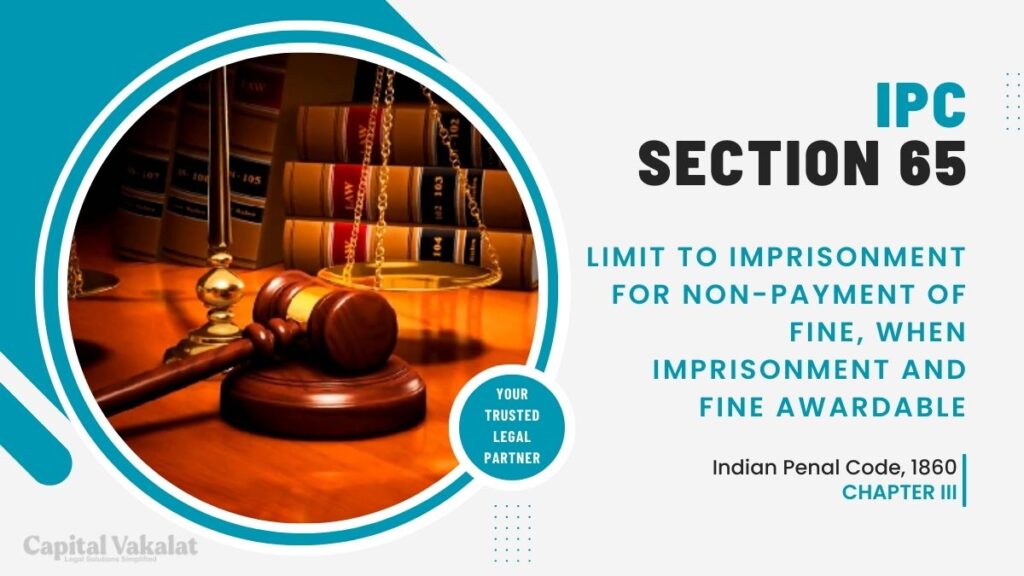In the realm of criminal law, the Indian Penal Code (IPC) stands as the bedrock that defines various offenses and prescribes penalties for those who transgress its provisions. Section 65 of the IPC, often overshadowed by more prominently discussed sections, addresses a crucial aspect of sentencing – the limit to imprisonment for non-payment of fines when both imprisonment and fines are awarded.

This article delves into the nuances of Section 65 IPC, shedding light on its significance and implications within the Indian legal framework.
Understanding Section 65 IPC
Section 65 of the Indian Penal Code deals specifically with situations where a person is sentenced to both imprisonment and a fine. It stipulates that if a person is unable to pay the fine, the term of imprisonment shall not exceed three months. This provision ensures that individuals who cannot afford to pay fines are not unduly burdened with extended prison terms.
The Purpose Behind Section 65 IPC
The primary purpose of Section 65 IPC is to strike a balance between punitive measures and the financial capacity of the offender. It recognizes that not all offenders have the means to pay fines, and imposing prolonged imprisonment solely for non-payment would be unjust. By limiting the imprisonment period to three months, the law ensures that sentences remain proportional to the gravity of the offense.
Non-Payment of Fine: A Common Dilemma
Non-payment of fines is a predicament faced by many individuals who find themselves entangled in the criminal justice system. This issue often arises due to socio-economic disparities and the inability of offenders to meet the financial obligations imposed by the court.
Safeguarding Against Arbitrary Imprisonment
Section 65 IPC acts as a safeguard against arbitrary imprisonment. Without such a provision, there would be a risk of imposing excessively harsh sentences on those who cannot pay fines, potentially leading to overcrowded prisons and societal inequities.
Legal Provisions for Fine Defaulters
While Section 65 IPC offers relief to those facing fines and imprisonment, other legal avenues also exist for fine defaulters. These include seeking remission of the fine or applying for community service orders, ensuring that justice is served while considering the financial constraints of the offender.
Imprisonment and Fine: A Delicate Balance
In cases where both imprisonment and a fine are awarded, judges must carefully weigh the circumstances of the offender. The duration of imprisonment should be commensurate with the gravity of the offense, and the fine should not impose an undue burden on the individual. Striking this balance is essential to ensure fairness in the criminal justice system.
It is imperative to note that Section 65 IPC is just one facet of the broader legal framework that addresses sentencing and penalties. Courts are vested with discretionary powers to tailor sentences to fit the unique circumstances of each case, keeping in mind the principles of justice, equity, and proportionality.
Conclusion
Section 65 of the Indian Penal Code serves as a vital provision that prevents excessive imprisonment for non-payment of fines. By limiting the imprisonment term to three months, it strikes a balance between punitive measures and an individual’s financial capacity. This provision reflects the fundamental principles of justice and fairness within the Indian legal system.
FAQs
What if an individual still cannot pay the fine after three months of imprisonment?
In such cases, the court may consider alternative measures, such as remission of the fine or community service orders.
Does Section 65 IPC apply to all offenses?
Yes, Section 65 IPC applies to all cases where both imprisonment and a fine are awarded.
Can the court increase the three-month limit in exceptional circumstances?
In exceptional cases, the court may have the discretion to extend the imprisonment term, but it must provide a valid and justifiable reason for doing so.
How can an individual request remission of a fine?
An individual can apply for remission of a fine through legal channels, typically by petitioning the court and providing reasons for the inability to pay the fine.